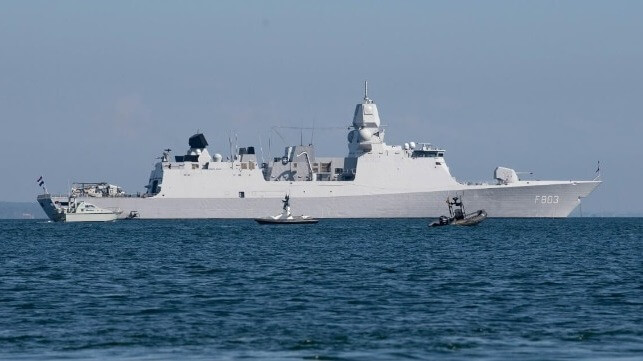Russian Jets Make "Unsafe" Low-Altitude Pass Over NATO Task Force

NATO's Allied Maritime Command has accused Russian air forces of making an "unsafe, unprofessional" low-altitude overflight past NATO warships in the Baltic Sea.
On Thursday morning, the warships of Standing NATO Maritime Group 1 were carrying out an exercise in the Baltic Sea. Two Russian fighters approached at an altitude of 300 feet and overflew the force at a distance of just 80 yards, according to the command. They refused to respond to communications, NATO said.
At the time of the encounter, the naval force was conducting air-defense training in a designated danger area, and the flyover at low altitude and close range could have ended poorly. "The interaction increased the risk of miscalculations, mistakes, and accidents," the Allied command warned. "NATO deemed the interaction unsafe and unprofessional."
After the sabotage attack on the Nord Stream gas pipeline system on September 26, NATO nations increased their naval presence in the Baltic and the North Sea to over 30 ships - twice the previous level, according to Foreign Policy.
As of early November, the NATO task force in the Baltic consisted of flagship Royal Netherlands Navy frigate HNLMS Tromp, Royal Norwegian Navy oiler HNoMS Maud and Royal Danish Navy frigate HDMS Esbern Snare. The core group was joined earlier in the month by vessels from Sweden and Finland, which have applied to join NATO and are in the middle of the accession process.
Nord Stream investigation continues
On Friday, investigators with two Swedish agencies released statements confirming that the explosions at the Nord Stream pipeline complex were acts of “gross sabotage.”
Sweden's Security Service and the prosecutor’s office released separate statements, both announcing that they have found evidence of sabotage, including unspecified "foreign objects." "Analyses that have now been carried out show traces of explosives on several of the foreign objects that were found. The advanced analysis work continues to be able to draw safer conclusions about the incident," Swedish prosecutor Mats Ljungqvist said.

that matters most
Get the latest maritime news delivered to your inbox daily.
The conclusion echoes that of their Danish colleagues, who announced in October that "powerful explosions" were responsible for the blast.
Poland and Ukraine have accused Russia of carrying out the attack on Nord Stream system, a charge which Moscow vehemently denies. The Russian government is the majority owner of the pipeline complex through state-owned gas company Gazprom.
